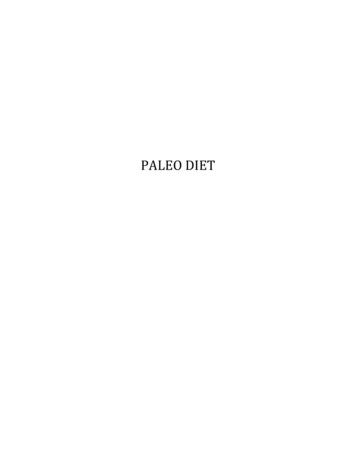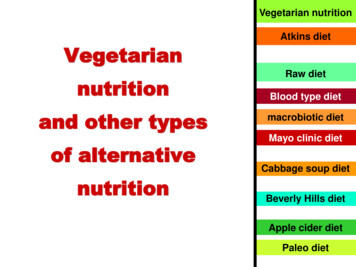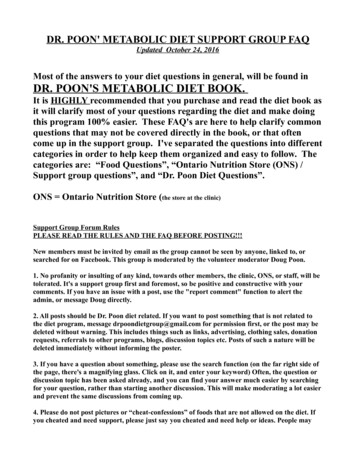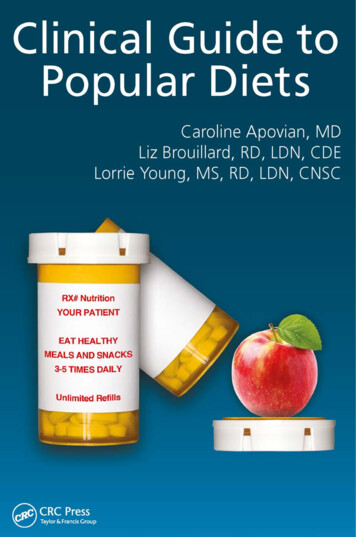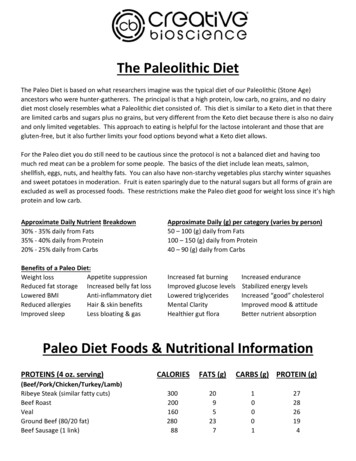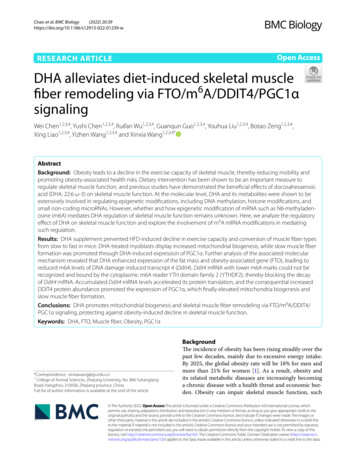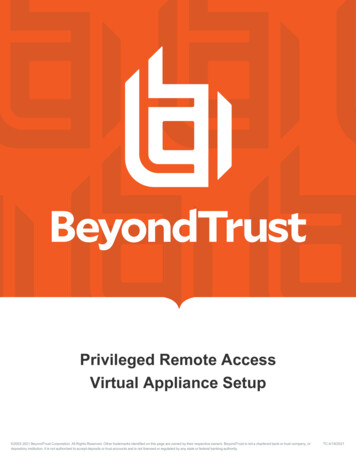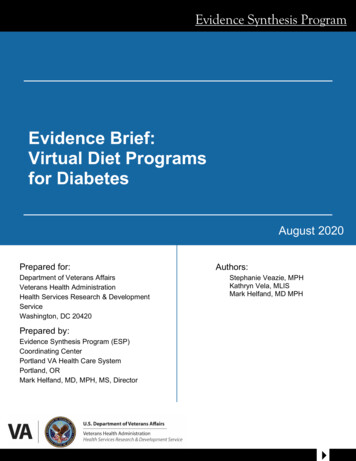
Transcription
Evidence Synthesis ProgramEvidence Brief:Virtual Diet Programsfor DiabetesAugust 2020Prepared for:Department of Veterans AffairsVeterans Health AdministrationHealth Services Research & DevelopmentServiceWashington, DC 20420Authors:Stephanie Veazie, MPHKathryn Vela, MLISMark Helfand, MD MPHPrepared by:Evidence Synthesis Program (ESP)Coordinating CenterPortland VA Health Care SystemPortland, ORMark Helfand, MD, MPH, MS, Director
Evidence Brief: Virtual Diet Programs for DiabetesEvidence Synthesis ProgramPREFACEThe VA Evidence Synthesis Program (ESP) was established in 2007 to provide timely andaccurate syntheses of targeted healthcare topics of importance to clinicians, managers, andpolicymakers as they work to improve the health and healthcare of Veterans. These reports help: Develop clinical policies informed by evidence; Implement effective services to improve patient outcomes and to support VA clinicalpractice guidelines and performance measures; and Set the direction for future research to address gaps in clinical knowledge.The program is comprised of three ESP Centers across the US and a Coordinating Center locatedin Portland, Oregon. Center Directors are VA clinicians and recognized leaders in the field ofevidence synthesis with close ties to the AHRQ Evidence-based Practice Center Program andCochrane Collaboration. The Coordinating Center was created to manage program operations,ensure methodological consistency and quality of products, and interface with stakeholders. Toensure responsiveness to the needs of decision-makers, the program is governed by a SteeringCommittee comprised of health system leadership and researchers. The program solicitsnominations for review topics several times a year via the program website.Comments on this evidence report are welcome and can be sent to Nicole Floyd, DeputyDirector, ESP Coordinating Center at Nicole.Floyd@va.gov.Recommended citation: Veazie S, Vela K, Helfand M. Evidence Brief: Virtual Diet Programsfor Diabetes. VA ESP Project #09-199; 2020. Posted final reports are located on the ESPsearch page.This report is based on research conducted by the Evidence Synthesis Program (ESP) Coordinating Centerlocated at the Portland VA Health Care System, Portland, OR, funded by the Department of VeteransAffairs, Veterans Health Administration, Health Services Research and Development. The findings andconclusions in this document are those of the authors who are responsible for its contents; the findings andconclusions do not necessarily represent the views of the Department of Veterans Affairs or the UnitedStates government. Therefore, no statement in this article should be construed as an official position of theDepartment of Veterans Affairs. No investigators have any affiliations or financial involvement (eg,employment, consultancies, honoraria, stock ownership or options, expert testimony, grants or patentsreceived or pending, or royalties) that conflict with material presented in the report.i
Evidence Brief: Virtual Diet Programs for DiabetesEvidence Synthesis ProgramTABLE OF CONTENTSExecutive Summary . 1Key Findings . 1Introduction . 6Purpose. 6Background . 6Scope . 8Key questions . 8Eligibility criteria . 9Methods. 10Searches and Study Selection . 10Quality Assessment & Data Extraction . 10Strength of Evidence Assessment . 10Synthesis of Data . 10Results . 12Literature Flow. 13Part I: Programs Promoting a Named Diet . 16Overview . 16TeLiPro (Meal Replacement Diet). 17Virta Health (Ketogenic Diet) . 17Low Carb Program (Low Carbohydrate Diet) . 19Better Therapeutics (Plant-based Diet) . 20Part 2: Programs that Promote Healthy Eating Based on Guidelines . 21u-Healthcare (US & South Korea Guidelines). 22ANODE (France Guidelines) . 23Our Path (UK. Guidelines) . 24GlycoLeap (US and Singapore Guidelines) . 24Part 3: Programs that Promote Healthy Eating Not Based on Named Diet or Guideline . 25Overview . 25My Dietitian . 26Noom Coach . 27Unnamed Programs. 28DiabMemory Nutrinaut . 28Summary and Discussion . 30ii
Evidence Brief: Virtual Diet Programs for DiabetesEvidence Synthesis ProgramLimitations . 31Gaps and Future Research . 32Conclusions . 34Acknowledgments. 35Operational Partners. 35Key Informants . 35References . 36FIGURES AND TABLESTable 1. Summary of Findings. 3Figure 1: Literature Flowchart . 13Table 3. Overview of Studies on Virtual Diabetes Diet Programs . 14Table 4. Detailed Findings from Studies of Named Diet Programs . 16Table 5. Detailed Findings From Studies of Programs That Promote Healthy Eating Based onGuidelines . 21Table 6. Detailed Findings From Studies of Programs That Promote Healthy Eating not Based onDiabetes or Dietary Guidelines . 25iii
Evidence Brief: Virtual Diet Programs for DiabetesEvidence Synthesis ProgramEXECUTIVE SUMMARYKey FindingsBackground 15 studies (9 RCTs, 1 non-randomized controlled trial, 3single-arm longitudinal studies, and 2 pre-post studies)evaluated 14 virtual diabetes diet programs with a coachingcomponent. In a single study that was poorly controlled, selectedparticipants (ie, those who were severely obese, interestedin an intensive diabetes management program, and willingto adhere to the ketogenic diet) experienced improvementsin weight and HbA1c after participating in the Virta Healthprogram for 10 weeks and maintained improvements ifthey continued to participate in the program for 2 years.Some of these participants also stopped taking medicationsand reversed their diabetes. In 1 RCT, 1 longitudinal study, and 1 before-after study,participants in 3 other programs (TeLiPro, Low CarbProgram, and Better Therapeutics) experiencedimprovements in 2 diabetes-related outcomes (ie, loweringHbA1c .5%, weight loss 5%, and/or diabetesmedication cessation) between 3 months to 1 year afterprogram initiation. In 5 RCTs, 1 longitudinal study and 1before-after study, participants in 6 other programs (uHealthcare, Our Path, GlycoLeap, Noom Coach, and 2unnamed programs) experienced improvements in 1diabetes-related outcome (either lowering HbA1c or weightloss) between 3 and 6 months after program initiation.Those who participated in Noom Coach also had higherrates of diabetes reversal than controls. Data on harms were sparse. Only studies of Virta Health,Better Therapeutics, and Noom Coach reported that nosevere or serious treatment-related harms occurred. As health systems like the VA begin to implement virtualdiabetes coaching programs, evaluations should emphasizecreation of appropriate control arms; ensuring comparablelong-term follow-up data; and attention to possible harms.Since evidence isn’t clear which features of programs aremost critical, a health system might also wish to comparevirtual programs delivering different types of diets.1The ESP CoordinatingCenter (ESP CC) isresponding to a requestfor a rapid review onvirtual diet programs fordiabetes from the VAHealth Services Research& Development(HSR&D). Findingsfrom this evidence briefwill be used to inform anevaluation of the VirtaHealth program amongVeterans with type 2diabetes.MethodsTo identify studies, wesearched MEDLINE,CINAHL and CochraneCentral Register ofControlled Trials(CENTRAL). We usedprespecified criteria forstudy selection, dataabstraction, and ratinginternal validity andstrength of the evidence.See our PROSPEROprotocol for our fullmethods (Registration #CRD 42020180278).
Evidence Brief: Virtual Diet Programs for DiabetesEvidence Synthesis ProgramIn recent years, the ketogenic diet has become an increasingly popular option for people lookingto lose weight, including those with type 2 diabetes. The ketogenic diet is a low carbohydrate,high fat diet, where approximately 70% of an individual’s calories come from fat, 20% fromprotein, and 10% or less from carbohydrates. Proponents of the diet point to studies indicating itcan help with weight loss, improve cholesterol and blood pressure, reduce the need formedications, and potentially reverse diabetes, while skeptics have pointed out there are no longterm ( 1 year) studies on the ketogenic diet, so it is unclear whether these benefits aremaintained over time and if there are any long-term risks.Virta Health is an online platform that delivers a ketogenic diet intervention – as well aseducation, coaching and physician management of medications – for people with type 2 diabetes.In 2019, Virta Health and the VA initiated a pilot project in which 400 Veterans with type 2diabetes were given access to the Virta Health program. On its website, Virta claims that 84% ofVeteran patients on the Virta treatment for 90 days achieved glycemic outcomes below thediabetes threshold or at least a 1-point drop in HbA1c (a measure of blood sugar). No data fromVirta’s VA pilot project have been published, so this claim cannot be verified. A separate, singlecenter, open-label, nonrandomized controlled study that provides the only evidence about theVirta program indicates that program participants can lose weight, lower HbA1c, discontinuemedications, and reverse diabetes. This study, which is expected to be completed in 2021, hasimportant limitations, and it is unclear how this program compares to other programs that deliversimilarly comprehensive, continuous remote care. If properly designed, the VA’s ongoingevaluation of the Virta VA pilot could address important gaps in the evidence about Virta.Virta’s ongoing evaluation might also close some gaps. Furthermore, the VA is contemplatingexpanding virtual diet programs and will need to design a prospective evaluation to assess theimpact of whatever program is selected.We conducted a rapid evidence review assessing the last 5 years of research on the Virta Healthprogram and other similar programs, focusing on weight loss, HbA1c, and medication reduction,the outcomes that have been emphasized by Virta and proponents of other virtual programs. Wealso focused on harms. In addition to the study of Virta, we identified 9 RCTs, 3 single-armlongitudinal studies, and 2 pre-post studies of 13 other virtual diabetes diet programs (Table 1).Studies examined 3 types of programs:1. Programs that promote a named diet (ie, one where certain categories of food ormacronutrients are limited, such as the ketogenic diet, low carbohydrate diet, or plantbased diet).2. Programs that promote healthy eating based on a diabetes or dietary guideline.3. Programs that promote healthy eating not based on a named diet or guideline.Overall, although the study of Virta had important limitations, it suggests that for some patients(ie, those who are severely obese, interested in an intensive diabetes management program, andwilling to adhere to the ketogenic diet), participation in Virta Health is associated withimprovements in diabetes outcomes such as weight and HbA1c at 10 weeks. Some participantsof the program also stopped taking medications and reversed their diabetes. These outcomeswere maintained for up to 2 years in patients who continue to participate in the intervention.Three other virtual diet programs for diabetes (TeLiPro, Low Carb Program, and Better2
Evidence Brief: Virtual Diet Programs for DiabetesEvidence Synthesis ProgramTherapeutics), all of which delivered a named diet, were associated with a clinically significantimprovement in 2 diabetes outcomes (ie, lowering HbA1c .5%, weight loss 5%, and/ordiabetes medication cessation) between 3 months and 1 year after initiation. Participants in 2 ofthese programs (TeLiPro and Low Carb Program) maintained improvements for 1 year (in 1program the intervention ended at 12 weeks, and in the other the intervention continued for ayear). Although benefits were more limited, 6 additional virtual diet programs (u-Healthcare,Our Path, GlycoLeap, Noom Coach, and unnamed programs from Wayne 2015 and Sun 2019)were associated with a clinically meaningful improvement in 1 diabetes-related outcome (eitherlowering HbA1c .5% or weight loss 5%) between 3 and 6 months after initiation. In theNoom Coach study, more people reversed diabetes in the intervention group than the controlgroup. Few studies reported on harms, but of those that did (Virta Health, Better Therapeutics,and Noom Coach), none found serious or severe treatment-related harms.Table 1. Summary of FindingsInterventioncategoryVirtual dietprogramsChanges Changesin weight* in HbA1c*Changes inmedicationuse*HarmsStrength ofevidence (SOE) &limitations 3-12% .8%-1.4% TeLiPro Virta Health (3 studies) (4 studies) Low CarbProgram BetterTherapeutics9-40% ofthose takingdiabetesmedicationsat baselinestoppedtaking them(3 studies).No serioustreatmentrelated harmsof Virta Healthor BetterTherapeutics(2 studies).Low SOE Each programonly evaluated in1 study. 2 studies wereuncontrolled 1 controlled studyhad unequalgroups atbaseline andother importantlimitationsincluding highattrition 2.5-8% .4-1.1%(4 studies) (3 studies)12% of pptsin uHealthcareinterventionreduceddosage oforalantidiabeticdrugs orinsulin(1 study).NRLow SOE Each programonly evaluated in1 study (exceptu-Healthcare) 2 studies wereuncontrolled High attrition anddifferentialattrition betweengroupsSupportingevidenceTotal NProgramspromoting anamed diet4 studies(1 RCT, 1 nonrandomizedcontrolled trial,1 single-armlongitudinal, 1pre-post)N 1,669Programspromotinghealthy eatingbased onguidelines u-HealthcareANODEOur PathGlycoLeap5 studies(3 RCTs, 1single-armlongitudinal, 1pre-post)N 1,2683
Evidence Brief: Virtual Diet Programs for DiabetesInterventioncategoryVirtual dietprogramsEvidence Synthesis ProgramChanges Changesin weight* in HbA1c*SupportingevidenceChanges inmedicationuse*HarmsStrength ofevidence (SOE) &limitations15% reduceddosage oforal diabetesmedication orinsulin(1 study).No severehypoglycemiaorhospitalizationoccurredduring NoomCareintervention (1study).Low SOE Each programonly evaluated in1 study Studies weresmall High attritionTotal NProgramspromotinghealthy eatingnot basednamed diet orguidelines 1-4% .4-1.9% My Dietitian Noom Coach (2 studies) (4 studies) Diab Memory Nutrinaut 3 unnamedprograms6 studies(5 RCTs and 1pre-post study)N 462*Represents changes in outcomes experienced among intervention group participants from baseline to follow-up. decrease; increase; NR Not reported; ppts participantsItalics Meets criteria for a minimum clinically important difference (ie, weight loss 5%, HbA1c reduction .5%,stopping any or all diabetes medications, no severe treatment-related harms)There were limitations to our rapid review methods as well as limitations of the primary studies.One limitation is that we did not include studies older than 5 years. An additional limitation isthat we had a single reviewer include studies and abstract data with second reviewer checking,which could have resulted in missing eligible studies or data. However, we made attempts toreduce this risk by establishing explicit inclusion criteria for studies and developing and using apiloted data abstraction tool.In terms of primary study limitations, one-third (5/15) did not include a separate control group,and among those that did use a control group, half (5/10) used a control group that was notsimilar to the intervention group in terms of intensity. This made it impossible to determine whatcaused the differences in outcomes (ie, the diet, the coaching, the access to virtual tools to trackoutcomes, the frequent interactions with health care providers or coaches, or a combination ofthese components).Our primary recommendations for the VA’s retrospective evaluation of the initial group ofVeterans enrolled in the Virta Health pilot project is to collect detailed information onparticipants’ baseline characteristics (including BMI, HbA1c, lipid levels, duration of diabetes,and any comorbidities) and measure the same outcomes (weight, HbA1c, and diabetesmedication cessation) at the same time points (3 months, 1 year, and 2 years) as the Virta study.We also recommend researchers use intent-to-treat analysis to assess the effectiveness of Virtaamong all participants who enrolled, and to consider stratifying by engagement in the program todetermine the minimum level of engagement needed for a clinically meaningful change inoutcomes.Our primary recommendation for the prospective evaluation of Veterans that may enroll in anexpanded virtual diet program in the future is to compare that program to a similarly intensiveintervention, either a different commercial program based on a different dietary approach or one4
Evidence Brief: Virtual Diet Programs for DiabetesEvidence Synthesis Programdelivered by VA staff (such as virtual health coaches). For both parts of the evaluation, werecommend that researchers capture a wide range of information on harms, includingexacerbation or development of conditions such as diverticulitis.By using a suitable comparator, we believe the VA evaluation could help determine whether thebenefits of the virtual diet program are dependent primarily on the specific diet or on the remotecontinuous care intervention and coaching support. As Veterans’ preferences for the type of dietthey follow are likely to vary, a practical solution to improving diabetes care should include avariety of diet options if the particular diet is not the critical component of the intervention. Thiscomparison could also inform how virtual diabetes programs might be adapted to meet the needsof a variety of Veterans with type 2 diabetes.5
Evidence Brief: Virtual Diet Programs for DiabetesEvidence Synthesis ProgramEVIDENCE BRIEFINTRODUCTIONPURPOSEThe ESP Coordinating Center (ESP CC) is responding to a request from the Department ofVeterans Affairs (VA) Health Services Research & Development (HSR&D) program for anevidence brief on the effectiveness and harms of Virta Health and other virtual diet programswhich include a coaching component for type 2 diabetes. The VA is planning to evaluate theeffect of Virta Health among Veterans, and findings from this review could help inform powerestimations, possible comparators and outcomes, and length of follow-up, among other studyfeatures.BACKGROUNDOne in 4 Veterans has some form of diabetes, which is twice the rate seen in the general USpopulation.1,2 Type 2 diabetes, characterized by insulin resistance that can result in deficienciesin insulin secretion, is the most common form of diabetes and is thought to be primarily causedby excess weight in the body.3 When untreated, type 2 diabetes can lead to microvascularcomplications including retinopathy (damage to the eyes that can result in blindness),nephropathy (damage to the kidneys that can result in kidney failure), and neuropathy (damageto the nerves in hands and feet that can result in amputation), as well as macrovascularcomplications including increased risk of heart disease, stroke, and coronary events such as heartattacks. Treatment of type 2 diabetes includes the self-management of lifestyle factors (eg, diet,exercise) to reduce or maintain weight, tracking of biomarkers (eg, blood glucose levels) that canindicate diabetes is worsening or uncontrolled, use of medications (eg, metformin, insulin) thataugment insulin levels, increase sensitivity to insulin, or impart other glucose-lowering effects,and monitoring and treating diabetes-related complications.While there is widespread consensus that maintaining a healthy diet is a key part of diabetesmanagement, there is no consensus on the ideal diet for diabetes. Guideline groups including theDepartment of Veterans Affairs/Department of Defense (VA/DOD), American DiabetesAssociation (ADA), and the Academy of Nutrition and Dietetics (the Academy) all recommendpeople with diabetes receive medical nutrition therapy (MNT) consisting of a nutritionassessment, diagnosis, intervention (including education and counseling), andmonitoring/evaluation. However, they disagree on whether patients receiving MNT shouldfollow a particular diet. The VA/DOD recommends that the Mediterranean diet (high intake ofvegetables, fruits, nuts, unrefined grains, and olive oil; moderate intake of fish and poultry; lowor moderate intake of wine; and low intake of red meat, processed meat, dairy, and sweets) beoffered first to patients, then a low carbohydrate (14-45% of total calories) and/or low glycemicindex diet be offered second if patients don’t choose the Mediterranean diet.3 Theserecommendations emphasize that the chosen diet be tailored to patient preferences and needs. Bycontrast, both the Academy and ADA recommendations state that a variety of diets areacceptable for the management of diabetes, with the Academy emphasizing that personalpreferences be considered and the ADA suggesting that clinicians focus on the commonelements among diets for diabetes including emphasis of non-starchy vegetables, minimizingadded sugars and refined grains, and choosing whole foods over highly processed foods.4,56
Evidence Brief: Virtual Diet Programs for DiabetesEvidence Synthesis ProgramIn recent years, the ketogenic diet has become an increasingly popular option for people lookingto lose weight, including those with type 2 diabetes.6 The ketogenic diet is a low carbohydrate,high fat diet, where approximately 70% of an individual’s calories come from fat, 20% fromprotein, and 10% or less from carbohydrates.7 The ketogenic diet is distinct from other types oflow carbohydrate diets (eg, Atkins, Paleo, and South Beach) as the majority of calories comefrom fat, rather than protein. The ketogenic diet dates back to the early 1900s when it wasdeveloped and used as a treatment for diabetes prior to the invention of insulin.8 Diets similar toketogenic such as the very low carbohydrate diet are currently recommended by groups such asthe National Institute for Health and Care Excellence (NICE) for instances in which patientsneed to lose weight rapidly, such as prior to joint replacement surgery or fertility treatments.9The theory underlying the ketogenic diet is that restricting carbohydrates limits the body’s accessto glucose (the body’s main source of energy) and forces it to burn stored fat (called ketones)instead.7 The process of burning ketones is called ketosis, and has been linked to a number ofmetabolic benefits.10 Proponents of the ketogenic diet cite studies indicating it can lead to weightloss, improve cholesterol and blood pressure, reduce the need for medications and reversediabetes.11,12 There have also been anecdotal accounts that the ketogenic diet is easier to followthan other types of restrictive diets, since high fat foods such as fatty cuts of meat, eggs, andbutter are allowed and there are no restrictions on the amount of calories consumed. However,skeptics have pointed out there are no long-term ( 1 year) studies of the effect of the ketogenicdiet, so it is unclear whether these benefits are maintained over time, and if there are any longterm risks to patients with diabetes such as worsening of cardiovascular disease risk factorsincluding LDL cholesterol, hypoglycemia (drop in blood glucose that can cause patients to passout) or ketoacidosis (harmful levels of ketones in the blood that can cause diabetic coma ordeath).13,14A 2019 rapid response (review of reviews)15 by the Canadian Agency for Drugs andTechnologies in Health (CADTH) provides the most recent and rigorous assessment of theeffectiveness and harms of low carbohydrate diets (including the ketogenic diet) compared tocontrol diets (no or minimal intervention) for diabetes. Due to the mixed findings of includedsystematic reviews, the report does not provide a definitive answer on the effectiveness andharms of these diets. The report looked at 10 systematic reviews published from January 2016 toOctober 2019. Because there were no primary studies that compared low carbohydrate diets tocontrol diets, the most direct evidence comes from 3 network meta-analyses (NMA) conductedin 3 reviews. One NMA16 of 52 RCTs (duration 3-48 months) found that low carbohydrate dietswere not significantly more effective than control diets at improving LDL cholesterol or HDLcholesterol, but were more effective at improving triglycerides (moderate strength of evidence).A second NMA17 of 10 trials (duration not reported) found that low carbohydrate diets were notsignificantly more effective than control diets at improving HbA1c, total cholesterol, HDLcholesterol, triglycerides, or BMI (strength of evidence not reported). A third NMA18 of 56RCTs (duration 3-48 months) found that low carbohydrate diets were significantly moreeffective than control diets at improving HBA1c and fasting glucose (low strength of evidence).Given the conflicting evidence on the ideal diet for improving outcomes for patients with type 2diabetes, researchers continue to evaluate the effects of different diets on patient outcomes. Inrecent years, researchers, clinicians, and patients have become increasingly interested in usingvirtual tools such as apps, websites, and online patient portals as an alternative or additionalmodality for supporting diabetes self-management.19-21 Using virtual too
loss) between 3 and 6 months after program initiation. . protocol for our full methods (Registration # . for people looking to lose weight, including those with type 2 diabetes. The ketogenic diet is a low carbohydrate, high fat diet, where approximately 70% of an individual's calories come from fat, 20% from protein, and 10% or less from .

